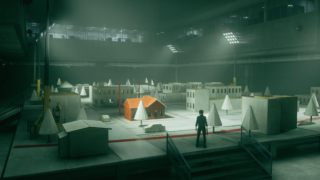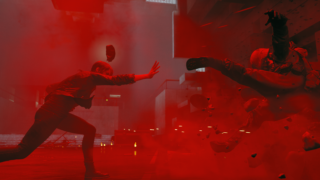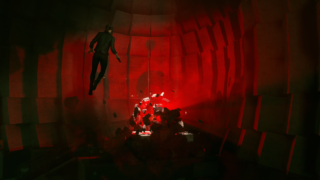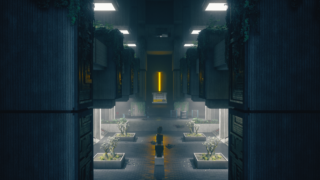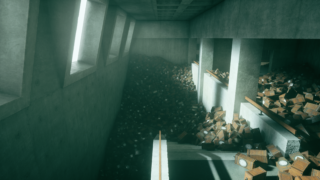Review: Control is Remedy’s finest game since Max Payne
Psychology and telekinesis combine in an intelligent action game
- Game Director
- Mikael Kasurinen
- Key Credits
- Paul Ehreth (Lead Designer), Sam Lake (Story)

The game calls them “objects of power”. They’re powerful because, as one boffin puts it, we can’t stop thinking about them, can’t stop pumping them full of our daydreams and nightmares, can’t stop making them mean something. That density of implication gives them energy, agency. It makes them dangerous.
One of the first you find is a Cold War diskette containing unused Soviet launch codes. Left to marinate for too long in an atmosphere of dread, without the catharsis of a mushroom cloud, it now hurls other objects around with pulverising force. Elsewhere, there’s a cigarette smouldering in an ashtray recognisable from a thousand film noir lobby scenes, an ashtray that wraps hexagonal-print corridors around itself, like trails of smoke – the layout always changing, the cigarette never quite going out.
The Bureau of Control exists to safeguard and study these volatile media artefacts, parachuting into psychic irruptions all over America, like the Men in Black spliced with a Facebook moderation team, and storing the eldritch items responsible at its elusive, shape-shifting headquarters, the Oldest House. The Bureau doesn’t merely look after objects of power, however: it makes use of them, for good and for ill.
One in particular is crucial to your role in Remedy‘s slick, imaginative shooter. It’s called the Service Weapon, and in the hand of protagonist Jesse Fayden, it looks like a gun, a hulking handcannon whose facets waver continually as though seen through water. The Weapon is the defining and re-definable possession of the Bureau’s Director, a position rudely foisted on Jesse when she stumbles into the Oldest House in search of somebody from her past.
The Bureau, it transpires, has been invaded by an entity Jesse terms the Hiss, a being of boiling, incantatory redness that whites out the mind and makes an amplifier of the flesh. In cavernous room after room, you find employees hooked and suspended as though in formalin, mouths brimming with the fervent, abstract chanting that is, in a sense, the invader’s body.
“So much of the game’s design, and so much of Jesse’s purpose within its story, is about reining in the concept and reducing everything to the cleanness and clearness of a third-person shooter.”
Other victims have become Hiss soldiers, mantled in violet light, fighting you with bullets, explosives and various supernatural techniques bestowed by their corrupter. Jesse is mysteriously immune to the Hiss, which enables her to rove the Oldest House’s sprawling metroidvania layouts, freeing “control points” that serve as fast travel and upgrade hubs, and appropriating objects of power to unlock a small but engrossing set of paranormal abilities.
If that last sentence strikes you as a bit underwhelming after the opening paragraphs, welcome to Control’s central contradiction – it wants you to keep its own flights of fancy in check. Stewed in a fondness for eerie Americana built up through games like Max Payne and Alan Wake, it can be triumphantly bizarre. But so much of the game’s design, and so much of Jesse’s purpose within its story, is about reining in the concept and reducing everything to the cleanness and clearness of a third-person shooter.

This is epitomised by the act of claiming control points, soothing architecture destabilised by the Hiss to reveal a vast and luxurious yet mundane world of late-60s boardrooms, laboratories, stairwells and pipework – a setting said to be ever-changing and treacherous, even on better days than these, but which proves, in practice, to be eminently knowable.
The House is a place, you’re told, where neighbouring dimensions shoot like brambles through window panes, a place where you can travel into a painting by pulling a lightswitch cord. But for all its cosmic waywardness, the building is obliged to keep its shape by the design ethos applied to it. It is a realm subject to the metroidvania principle of “gating”, with locked doors you’ll need to return to once you’ve obtained a higher-level keycard, and areas that can only be traversed once you’ve acquired a particular ability.
We offer all this not as damning criticism, firstly because if Control is a genre piece, it is an extremely good one – a florid, grandiose and witty example of sci-fi shootybanging that builds on all the right parts of 2016’s Quantum Break. And secondly, because it’s more interesting to read Control not as another mismatch between premise and execution but a story about two kinds of joy, the joy of losing control and regaining it, amazement followed by vengeful disambiguation.
You enter into regions where the very technology running the game appears to splinter and deform, lighting glitches trailing off into the abyss, ghostly images of lakeside forests hazing the view. But then you bring the Service Weapon to bear and the possibilities spiral down into headshots and cover spots, blue flecks of dropped enemy health (Jesse doesn’t self-heal, so you’ll need to keep pushing forward to restore yourself) and above all, the play of conveniently loose objects in every battle arena.
Control’s ace card as a shooting game is a telekinetic throw worthy of Luke Skywalker himself. It’s the first special ability you’ll obtain and the most satisfying throughout, thanks in no small part to some toe-curling audio design. Hold a button and cackle as a forklift loader comes spinning and whooping down a hall to hover tremulously by Jesse’s hand. Let the button go to lob it in a screen-blurring cascade of particles and ragdoll physics.
“All this enthusing notwithstanding, we’re not sure Control is Remedy’s finest action game – that accolade probably still goes to Max Payne – but it is perhaps Remedy’s best-written and staged game”
This flamboyance is typical of the ability design, and battles quickly become a question of showmanship, Jesse soaring like Jean Grey to carpet-bomb scurrying infantry or duel with rival telekinetics (the frame-rate, it must be said, often suffers for the frenzy of the action).
New abilities aside, the Service Weapon can be modded and transformed into other kinds of gun, including a sensational three-hit grenade launcher, and the House’s winding, multi-levelled chambers offer plenty of room to perform. Though trendily nondescript in dull leathers, Jesse herself gives off a feeling of brute self-possession we haven’t really felt in a third-person game since Hangar 13’s Mafia 3. It’s a pleasure to inhabit her as she pacifies her surroundings, applying direction to the House’s wayward spaces.
All this enthusing notwithstanding, we’re not sure Control is Remedy’s finest action game – that accolade probably still goes to Max Payne – but it is perhaps Remedy’s best-written and staged game, as abstract and self-aware as the developer’s previous projects, but with a little less of Remedy’s trademark goofiness and taste for blunt exposition. Like Alan Wake, Jesse has an inner monologue, the camera cutting to close-up as she cogitates. Unlike Alan Wake, her inner monologue is more of an intrepid dialogue with another, silent presence than lumpy self-narration.

The game mixes media like Quantum Break, but does so not via awkward separately downloaded cutscenes, but by projecting footage into its world. There’s a touch of Portal’s corporate whimsy, even, in the form of lab presentations given by a bright-eyed and bushy-tailed lead scientist.
The characters together with those objects of power are strongly informed by Carl Jung’s theory of archetypes – potent images long-marinated in our collective unconsciousness. The game hardly digs into these ideas at length, but it has a lot of fun with them. Odder personalities include the Board, a lowering triangular monolith whose speech is an either/or collage of synonyms, and the Bureau’s foul-mouthed and mercurial Finnish janitor.
That touch of Remedy’s own cultural origins speaks to how Control is on some level a game about the journey of a studio. The irony of the objects of power is that they aren’t symptoms of a universal fascination, but specific to a game developer in thrall to the stranger frontiers of US TV, cinema and literature, from Stephen King to David Lynch.
In Control’s concrete labyrinth, with its contorted wood-panelling and infinitely extending offices, Remedy has made a circus of those obsessions – a fiction sturdy enough to house the fictions it can’t look away from. At one point, Jesse reflects to herself that as demented as the House can be, it feels comfortingly sane, or at least, insane in just the right way. So it surely is for her creators.
Control is Remedy's finest creation since the original Max Payne
- A marvellous setting that's home to some brilliant design experiments
- Small but scene-stealing array of paranormal abilities
- Wry, eerie, high-concept narrative and staging
- Uncharacteristically deft dialogue writing
- Not nearly as scary and subversive as it promises to be
